Crassula muscosa
Crassula muscosa, synonyms Crassula lycopodioides[2] and Crassula pseudolycopodioides, is a succulent plant native to South Africa and Namibia, belonging to the family of Crassulaceae and to the genus Crassula. It is a houseplant grown worldwide and commonly known as rattail crassula,[2] watch chain, lizard's tail, zipper plant and princess pines.
| Rattail crassula | |
|---|---|
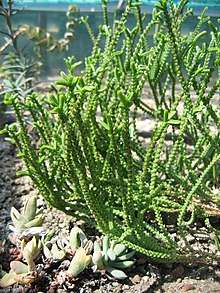 | |
| Crassula muscosa var. accuminata | |
| Scientific classification | |
| Kingdom: | Plantae |
| Clade: | Tracheophytes |
| Clade: | Angiosperms |
| Clade: | Eudicots |
| Order: | Saxifragales |
| Family: | Crassulaceae |
| Genus: | Crassula |
| Species: | C. muscosa |
| Binomial name | |
| Crassula muscosa | |
| Synonyms | |
|
Crassula lycopodioides | |
Etymology
The scientific and the common names refer to its appearance: muscosa derives from the Latin word muscosus, meaning "mossy". Lycopodioides, referred to the clubmoss Lycopodium, derives from the Greek words "Λύκος" (líkos, wolf), "πόδι" (pódi, foot) and οειδής (oeides, -oid, similar to).
Description
Crassula muscosa has very small, light green leaves that are densely packed around a thin stem, and the arrangement of the leaves around the stems gives them a square shape.[1] It grows as an intricate bush with very small yellow-green flowers, with a maximum height of 15–20 cm.
Distribution and habitat
Crassula muscosa is native to South Africa (the Cape Provinces, the Free State and the Northern Provinces) and Namibia.[3] It grows in environments with a moderate degree of humidity, in which the soil is well drained and composed of fertile soil and sand.
Cultivation
During the cold season, it tolerates temperature drops up to a minimum of 6-8°C, requiring little water. While in summer it needs a lot more water and it should be not exposed to full sun, as it only values brightness but would suffer under excessive sunlight. When these conditions are not met the plant begins to dry and stiffen, generally starting from the base of the stem up to the tips. It is an invasive species and easily propagated from stem cuttings. If the environment maintains a stable temperature of 20-21°C, with adequate humidity and brightness, the cutting will therefore root and grow rapidly.
Gallery
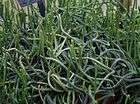
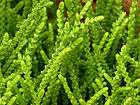
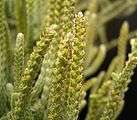
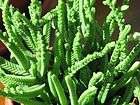 Detail of leaves
Detail of leaves
Varieties
- Crassula muscosa var. accuminata
- Crassula muscosa var. muscosa[4]
- Crassula lycopodioides var. purpusii
- Crassula muscosa var. rastafarii[5]
- Crassula muscosa var. sinuata[6]
- Crassula muscosa var. variegata
References
- Crassula at succulent-plant.com (see the section "Crassula muscosa")
- Crassula muscosa at houseplantz.net
- "Crassula muscosa". Germplasm Resources Information Network (GRIN). Agricultural Research Service (ARS), United States Department of Agriculture (USDA). Retrieved 2015-08-10.
- "C. muscosa var. muscosa at learn2grow.com". Archived from the original on 2016-06-30. Retrieved 2012-02-27.
- C. muscosa var. rastafarii at plantdatabase.ie Archived 2012-09-06 at Archive.today
- C. muscosa var. sinuata at tropicos.org
External links
| Wikimedia Commons has media related to Crassula muscosa. |

- Crassula muscosa at learn2grow.com